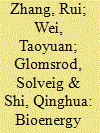| Srl | Item |
| 1 |
ID:
136210


|
|
|
|
|
| Summary/Abstract |
Biomass in the form of crop residues and firewood is a major energy source for rural households in China. A survey conducted in the provinces of Shanxi, Zhejiang, and Guizhou shows that 37 percent of rural households use bioenergy for heating and cooking and that bioenergy accounts for 18 percent of their total energy consumption. Most of the biomass used for energy is burned in traditional stoves, contributing to indoor air pollution in rural homes. Crop residues also are commonly burned in the fields, contributing to the high level of outdoor air pollution in China. Our econometric analysis of the key determinants of bioenergy use shows that bioenergy consumption falls modestly with income growth, increased time required for biomass collection, and less farmland. Hence, open burning of some biomass is an optimal choice and is likely to become more of a problem without policy intervention. These findings suggest that a more sustainable use of biomass requires policies that promote cleaner, more efficient bioenergy combustion technologies and increase the economic value of biomass such that local households can benefit from biomass collection.
|
|
|
|
|
|
|
|
|
|
|
|
|
|
|
|
| 2 |
ID:
136263


|
|
|
|
|
| Summary/Abstract |
Using nationally representative rural household panel data from 2003 through 2007 in China, we examine economic gains of cadre status and channels through which cadre status increases household earnings. We find that income of cadre households was approximately 10 percent higher than that of non-cadre households on a per capita basis. The cadre income premium did not come from agricultural income but mainly from non-agricultural sources, especially the income from the village and the government. We also find that cadre income premiums were much larger and more significant in economically advanced regions than in less developed regions and in villages that exhibited higher income inequality than their counterparts. Furthermore, this study shows that newly elected cadre households acquired the economic gains immediately and cadre households lost the economic gains immediately when they lost their cadre status, which implies that the cadre economic gains were less likely attributable to human capital of cadres but mainly due to cadre status. Our findings provide evidence for the ongoing debate on distribution of economic gains during the process of transition in emerging market economies.
|
|
|
|
|
|
|
|
|
|
|
|
|
|
|
|
| 3 |
ID:
095931


|
|
|
|
|
| Publication |
2010.
|
| Summary/Abstract |
This paper studies the substitution effect of permanent land-use rights on endowment insurance in China. We first explain the rationality using an overlapping-generations model with heterogeneous households possessing land-use rights or not, and find that economic agents profiting from land in the latter stage of their life tend to save less for retirement than their land-deprived counterparts. Empirical evidence from village-clustered Chinese survey data on rural households supports this finding, locating a significant negative effect of land on social and commercial endowment insurance purchase. Apart from the important policy implication of compensating land-deprived farmers with insurance, our theoretical and empirical models both yield unexpected informing findings.
|
|
|
|
|
|
|
|
|
|
|
|
|
|
|
|